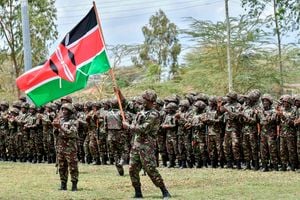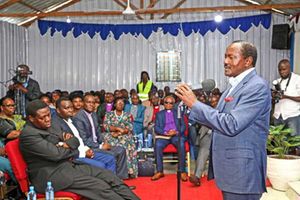Luxury spending ban on ministry bosses
What you need to know:
- Mr Rotich has also stopped ministries from holding meetings in private hotels to reduce the government’s hospitality budget. Such meetings must now be held in government institutions with catering facilities.
- Taking a cue from a recent Cabinet directive, Mr Rotich put a freeze on new staff recruitment. In addition, he has frozen the purchase of office furniture, computers and other equipment. The freeze also affects promotions and pay raises for public workers.
- In his new transport rules, Mr Rotich said there were too many government vehicles on the roads outside working hours with some officers sometimes using government vehicles even when they were not on duty.
The National Treasury has announced tough austerity measures aimed at raising Sh121 billion needed to pay for the salaries of teachers, lecturers, health workers and allowances for police officers in this financial year.
Beginning this month, Finance Secretary Henry Rotich has banned most government officers from flying business class while on official trips locally as part of a raft of measures to cut spending on air transport.
Only Cabinet and Principal Secretaries and parastatal heads will be allowed to travel business class.
Mr Rotich has also stopped ministries from holding meetings in private hotels to reduce the government’s hospitality budget. Such meetings must now be held in government institutions with catering facilities.
All government vehicles found on the road after the stipulated hours will also be impounded with their drivers being surcharged for using the vehicles outside the approved hours.
Government officials responsible for such misuse will forfeit one month commuter allowance.
A circular from Mr Rotich, dated December 17, said delegations led by Cabinet Secretaries would not exceed five officials while those led by principal secretaries would be limited to only three.
In a circular sent to all Cabinet Secretaries, Mr Rotich said: “All domestic travels should be in the economy class.”
He also directed that all international meetings, workshops, seminars and study tours be reassessed to ensure that only those that have direct benefits to the public were approved.
Mr Rotich also discouraged instances where officers arranged domestic travel and accommodation from one town to another to discuss strategy documents, reports and assignments that would ordinarily be done in public offices.
“Such expenses are hard to justify and should be discouraged at all times,” says the circular, which also bans holding of breakfast meetings in hotels.
It directed officers from the headquarters of ministries to, as much as possible, delegate field activities like official opening of workshops to their counterparts in the counties to avoid unnecessary travel.
Taking a cue from a recent Cabinet directive, Mr Rotich put a freeze on new staff recruitment. In addition, he has frozen the purchase of office furniture, computers and other equipment. The freeze also affects promotions and pay raises for public workers.
Also stopped until further notice is foreign training funded by the Exchequer.
The circular, which was released a week to Christmas, prohibited ministries from printing Christmas cards, calendars and other publicity materials like T-shirts and caps. Only the Ministry of East African Affairs, Commerce and Tourism was authorised to print calendars on behalf of the government.
In his new transport rules, Mr Rotich said there were too many government vehicles on the roads outside working hours with some officers sometimes using government vehicles even when they were not on duty.
He directed that any officer earning a commuter allowance but continued to use government transport outside official working hours to be surcharged.
“By a copy of this circular, the Government Vehicle Check Unit is reminded to impound vehicles being used outside official working hours without the necessary authority and surcharge drivers and officers found to contravene the directive,” the circular said.
The Treasury also warned officers from entering into procurement contracts without following proper procedures, blaming such situations for audit reports’ revelations of mismanagement.
Mr Rotich said the measures meant to control government expenditure came in the wake of slow tax collection and increasing expenditure pressure.
They are also meant to ensure “the government not only lives within its means, but also maintains and safeguards macro-economic stability by containing domestic borrowing”.
Mr Rotich said the purpose of the circular was to advise accounting officers on the need for commitment and expenditure control, fiscal discipline and prudent financial management of public resources.
The budget for the 2013/2014 financial year, he said, was based on a cautious macro-economic framework, having taken into account the weak growth in the global economy.
But an assessment of the first quarter of the current financial year performance of revenue indicated underperformance.
“While we are optimistic that this will improve within the remaining quarters of the financial year, there is need to contain expenditures within the approved budgetary provision,” he said,
He said the revenue underperformance was aggravated by the rising expenditure pressure on ministries, which was more than Sh346 billion by the end of November 2013.
The circular was copied to the Head of Public Service, the Auditor General, the Inspector General of Police Service and all accounting officers.




